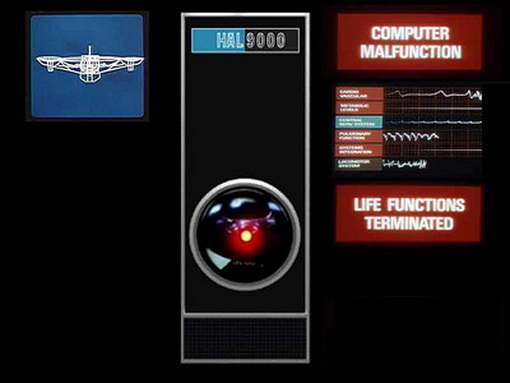|
|
This topic comprises 3 pages: 1 2 3
|
|
Author
|
Topic: Another digital disaster
|
Martin McCaffery
Film God

Posts: 2481
From: Montgomery, AL
Registered: Jun 99
|
 posted 09-30-2012 07:55 PM
posted 09-30-2012 07:55 PM





http://popdose.com/no-concessions-digital-disaster-at-the-new-york-film-festival
quote:
No Concessions: Digital Disaster at the New York Film Festival
BOB CASHILL SEPTEMBER 30, 2012
The New York Film Festival, which got underway last Friday, celebrates its 50th anniversary this year. I’ve attended every year since 1994. I’ve seen dozens of movies there–some extraordinary, many good, some run-of-the-mill, a few terrible. I wondered where Brian De Palma’s Passion, screened on Saturday, would fit in.
I’m still wondering. In what was for me an unprecedented event in my decades of festivalgoing, the screening was cancelled. Why? Three words: Digital Cinema Package, or DCP.
What is DCP? It’s heralded as the future of cinema projection, but really it’s the present; chances are your local multiplex has gone DCP, as your local independently owned theater or repertory house struggles to find a way to pay for it as celluloid goes up in smoke. The brave new world of digital projection comes with pitfalls, however. Like, if the system malfunctions, and no one can get a grip on what went wrong, you’re fucked like the fucking Diaz brothers, as the Film Society of Lincoln Center learned the hard way last night.
If you follow the festival at all you’ve been reading a lot about how Richard Pena, its programming director, is bowing out after 25 years of distinguished service. “I bet he wishes he retired last year,” grumbled a fellow patron as we all exited Alice Tully Hall after more than an hour of waiting. It had been a trying day: apparently a DCP of a Mexican film shown in the afternoon, Here and There, was plagued by intermittent subtitles that were here and there for half an hour until the problem was fixed. That was nothing compared to this utter fiasco, however. Has a festival presentation ever been cancelled due to a mechanical glitch? Not in the film cans days that I can recall.
Poor Pena–he’s a good guy (I interviewed him for Newsweek.com in 2001) and there he was, having to face not only a disappointed crowd but Brian De Palma, who’s not exactly Mary Sunshine. (I interviewed him for Cineaste about his last film, Redacted, which played without incident at the festival in 2007.) From my balcony seat I could see the filmmaker growing progressively more baleful, and when he was escorted from his box I knew we would not be seeing his movie. It can’t have been pretty backstage: “See this? I left my trademark safari jacket at home and put on a suit and tie for this thing! I was goddamned cheerful in my opening remarks, too!”
Whatever the case, it was a humiliation. Pena, who had to keep coming onstage to deliver the worsening news, said that the DCP has been tested without incident minutes before showtime, but minus a code had somehow locked down. Minus someone who could fix the code that was it for the evening. That’s not the movies we knew and loved; that’s a plot contrivance on an episode of 24. Maybe they should rename Digital Cinema Package HAL, in honor of 2001‘s errant computer.
After a half hour or so of waiting Pena announced that audience members who couldn’t stay could get refunds at the boxoffice. Only 10-15% seemed to. Which was touching; we wanted to see the movie and were willing to put up with the inconvenience. (I watched the French-made Love Crime, the basis of Passion, the other night and wanted to know, like, what was up with the masks? And the chokehold?) But it was out of Pena’s hands, or De Palma’s hands, or any human hands. It was a glitch in the machine, a hiccup in the software. And with that the 50th anniversary of the New York Film Festival was tainted.
Watch this space for actual festival reviews, if technology doesn’t bungle further screenings. Too bad they can’t project film at a film festival anymore.
Print PDF
Share this:
| IP: Logged
|
|
|
|
|
|
|
|
|
|
|
|
|
|
|
|
|
|
|
|
|
|
Tony Bandiera Jr
Film God

Posts: 3067
From: Moreland Idaho
Registered: Apr 2004
|
 posted 10-01-2012 07:00 PM
posted 10-01-2012 07:00 PM




I'm gonna disappoint my "fans" who were hoping I'd go on another D-Crapma rant here and say that it was not, in this case, the format's (DCP) fault....Bobby said it best here:
quote: Mr. Trajan
The biggest problem is various decision makers placing far too much trust in the technology to work 100% perfect all of the time. These security keys with ridiculously short validity times is a clear symptom of that misplaced trust.
Which is what it sounds like from here. Remember in the not-so-distant past when film cans came with padlocks on them? And many folks had to resort to cutting locks off or cancelling shows because the dumbasses at the studios didn't release the combination on time..or to the right person?
And even if you got the combos in time, I have heard of, and personally had, situations where the print was fucked up (wrong title, duplicate reels, etc.) which you didn't find until the powers that be decided it was ok for you to look at the film.
The other key point Bobby made, and the crux of my (former) D-Cinema hate, was the simple fact that everyone involved was forcing this down our throats as the "PERFECT SHOW EVERY TIME" medium. This, while the technology was (is) not perfected yet.
This and many other incidents has shown we have a long way to go on this...and I doubt it will ever be financially possible to get a perfect system with enough redundancy to totally eliminate lost shows.
It might be possible to get things to the reliability of a properly maintained film system with a competent projectionist..but we are a long way from that now.
| IP: Logged
|
|
|
|
|
|
Randy Stankey
Film God

Posts: 6539
From: Erie, Pennsylvania
Registered: Jun 99
|
 posted 10-01-2012 11:17 PM
posted 10-01-2012 11:17 PM




Why can't they use dual factor encryption/passwords like is used on banking websites or secure VPNs?
You have to put in your username and password then through one means or another, such as a secure dongle or your cell phone, you receive a second password which is (supposedly) known only to you and the system. You must have both passwords to access. After the dual factor encryption expires (an hour, a day, a week, etc.) you have to get a new one.
As an example, for a digital movie system, you might get the regular KDM which authorizes you, as a theater, to play that movie. Then, you call, e-mail or use a dongle to receive the second part of the password which will authorize you to play that movie for a certain period of time.
Receive the KDM via the usual channels and upload it with your USB stick, just like you do now. Then, you have to type in an 8 character code using the keypad on the machine or server to activate the movie for a playdate or series of playdates.
In the above case, let's suppose the movie director or the technical director of the film festival had a dongle.
The theater already uploaded their KDM which authorizes them to play the movie. The director or TD pushes a button on his dongle and enters "p455w0rd" on the keypad. The movie is good to go.
For daily operation in theaters, there could be a 24/7 hotline (like Technicolor) where you can call to get your second key.
I don't know if this would really work in real life but, in theory, the "malfunction" at that festival would have been prevented by such a system.
| IP: Logged
|
|
|
|
All times are Central (GMT -6:00)
|
This topic comprises 3 pages: 1 2 3
|
Powered by Infopop Corporation
UBB.classicTM
6.3.1.2
The Film-Tech Forums are designed for various members related to the cinema industry to express their opinions, viewpoints and testimonials on various products, services and events based upon speculation, personal knowledge and factual information through use, therefore all views represented here allow no liability upon the publishers of this web site and the owners of said views assume no liability for any ill will resulting from these postings. The posts made here are for educational as well as entertainment purposes and as such anyone viewing this portion of the website must accept these views as statements of the author of that opinion
and agrees to release the authors from any and all liability.
|

 Home
Home
 Products
Products
 Store
Store
 Forum
Forum
 Warehouse
Warehouse
 Contact Us
Contact Us




 Printer-friendly view of this topic
Printer-friendly view of this topic











![[Wink]](wink.gif)

![[Big Grin]](biggrin.gif)





